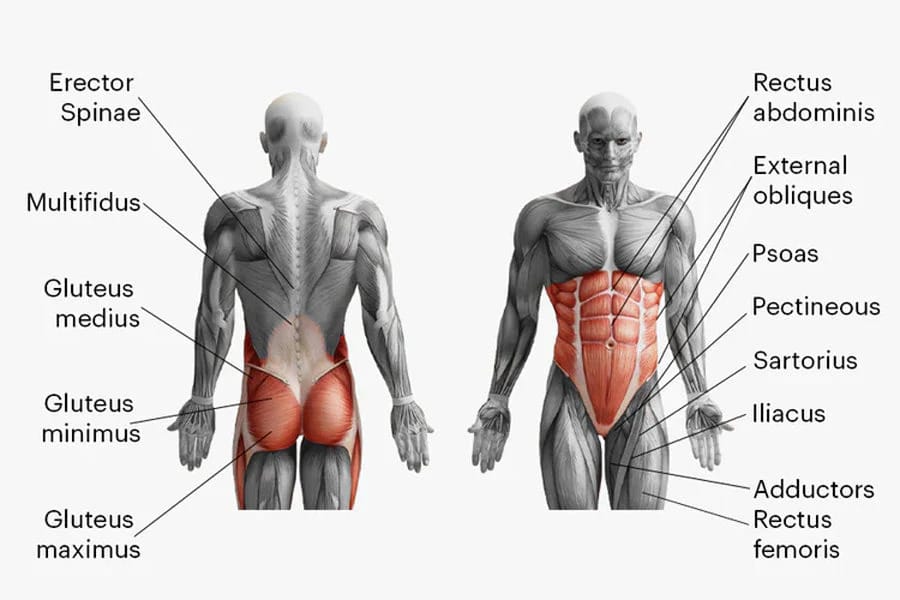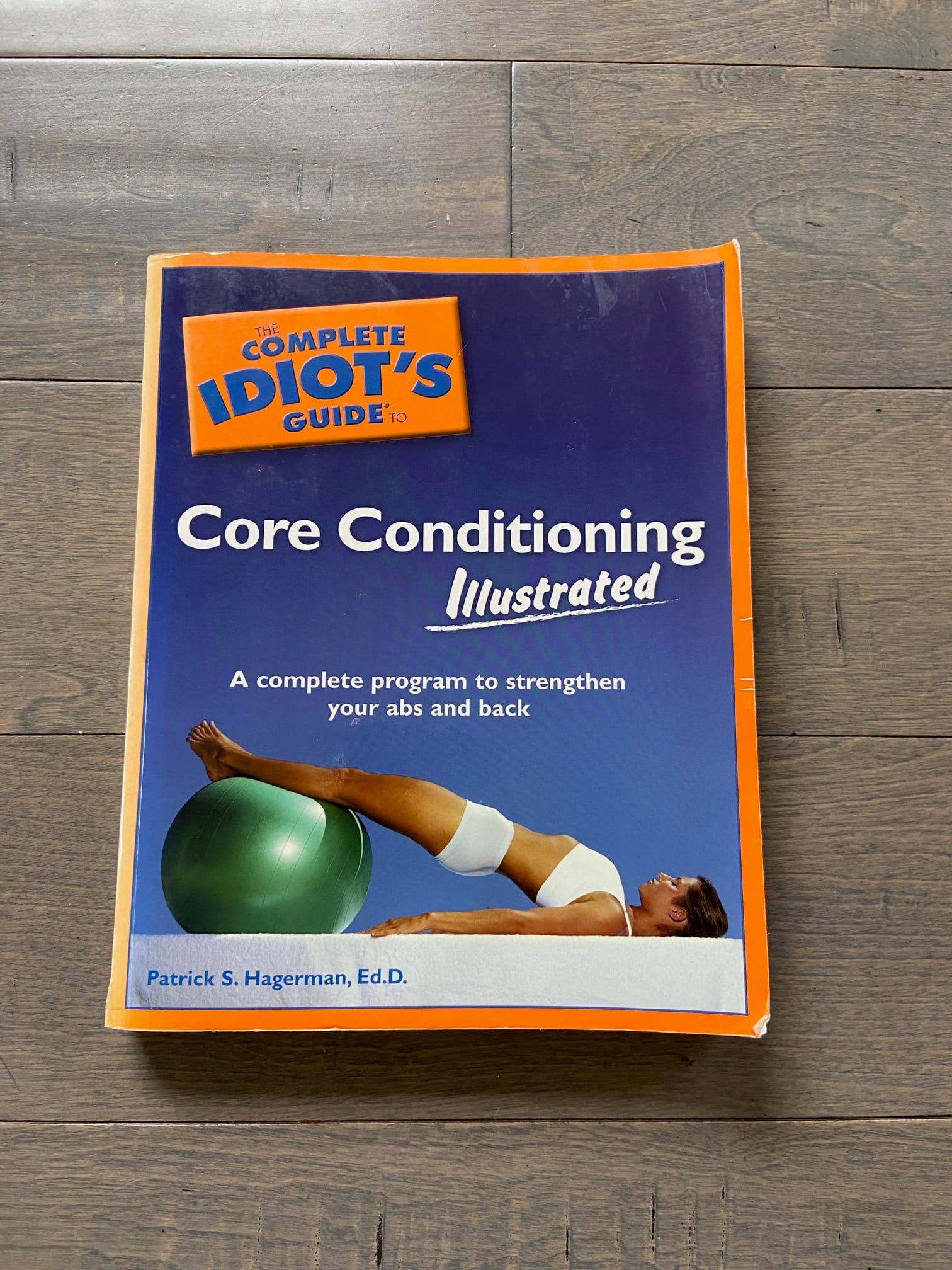The Core Trilogy Volume One: The Most Influential Book I've Ever Read.

Although reading might be a lost art, there are still many people whose lives have been altered by a single book. Perhaps the book in question allowed them to live inside the skin of someone from a completely different background, transported them to a place of awe and wonder, or offered them hope and solace.
Perhaps the book was "Giovanni's Room," "The Bluest Eye," "Lemony Snicket," or the Bible.
I have such a book in my life. It's called "The Complete Idiot's Guide to Core Conditioning."
Don't let the prosaic title fool you. I almost did. That would've been a monumental mistake — the book altered the trajectory of my career.
The book's signature blue and orange cover lets you know that within these pages lurks a treacherous and foreign terrain, best navigated by a steady and knowledgeable hand. (1)
I bought the book on a whim. It was on sale, and I figured what little information I could glean from the book would be worth the sale price. I also thought that I was well outside the book's target demographic. After all, I had always played sports (basketball and cycling), I went to the gym constantly, and when I looked in the mirror, I liked the image that was reflected back.
But I was wrong.

When I went to the gym, I focused on the "procreative muscles," i.e. the muscles that would attract romantic partners. The biceps. The pecs. The larger leg muscles. These are the "show" muscles and, although there's nothing wrong with focusing on them, they're not intimately connected to movement the way the core muscles are. So, when I opened the book and tried some of the exercises, I was in for a rude awakening.
I couldn't do many of them.
The lack of focus on the smaller muscle groups (deep ab muscles, adductors, hip flexors, etc) meant I had very little muscular endurance. It's the same principle that undergirds yoga and pilates. To my dismay, it turned out that I was in the book's target demographic: I was a complete idiot when it came to core training.
That was two decades ago. Since that time, I've been diligent about focusing on core training and have made teaching those principles the central theme of my business.
I've decided to make the articles on core training a trilogy. The first article (this one) will focus on what the core is and why you should focus on it. The second article concerns basic core exercises and the last article details some advanced core training techniques.
What exactly is the "core"?
The simplest way of conceptualizing the core is to visualize the sternum (the deep notch between your chest plates) and draw a straight line down to your pelvic region. Everything that is included in this area — both on the front and back side — is included in the core. Consequently, the largest muscle groups in the core are the lower back complex, ab complex, and glutes. For further reference, see the illustration above.
The benefits of core training.
The benefits of core training are myriad. Core training should be a focal point for any training regimen. Among the benefits:
- Injury prevention. This might be the most compelling reason to have a good core training regimen. Many people suffer from low back pain, primarily due to extended sitting, sedentary lifestyles, and the rigors of aging. A good core regimen will strengthen both your ab and lower back complex and help mitigate the damage. It sounds like a cliche, but it's true: you'll never know the injuries you've prevented by strengthening your core. And, since we're trafficking in cliches, in this case, ignorance is bliss.
- A strong core helps with performing everyday activity. Your core is the fulcrum that generates movement, provides a center of balance, and acts as a "shock absorber." Even simple activities such as bending over to tie your shoes, getting out of the car, and picking up groceries rely on a solid core for optimal efficiency and fluid movement. A weak core will cause you to overcompensate and use inappropriate muscles for movement, leading to injury.
- Enhanced athletic performance. The core is intimately involved in athletic activities. Think of swinging a baseball bat or a golf club, stabilizing while throwing a football, or twisting to return a serve in tennis. All these activities require a strong center of balance and a focus on the smaller stabilizer muscles such as the deep ab muscles and hip flexors. Numerous studies have shown the benefit of core training in improving performance metrics such as agility and muscular endurance. (2)
- Increased balance. I'm an avid hiker. I also have flat feet, which contributes to my ankles being 'hyper flexible." This, in turn, leads to balance issues and risks of falling on the trail. Because I focus on my core complex when I train (glutes, abs, and lower back muscles) my base of support is very solid and compensates for my weaker ankles. Balance and core training is also crucial for people as they age. It minimizes the risk of falling, and — if you do fall — it helps mitigate the damage.
- Improves Posture. Sitting for an extended time is very, very bad for you. I've written before about the perils of extended sitting, here: https://beneath-the-skin.ghost.io/a-modern-day-malady-upper-crossed-syndrome/ and here: https://beneath-the-skin.ghost.io/what-is-lower-crossed-syndrome-and-what-can-i-do-about-it-2/. Prolonged sitting can lead to postural distortions, low back pain, and neck strain. A strong core can help with postural alignment and safeguard you from some of the injuries associated with sitting.
It's been over two decades since I purchased "The Complete Idiot's Guide to Core Conditioning." It's dusty, worn, and full of highlighting. I'll never get rid of it. Not only does it have sentimental value (it kick-started my career) but it has proven to be worth every penny I spent on it. And then some.
Notes:
(1) I also purchased "The Complete Idiot's Guide to Learning Yiddish" and "The Complete Idiot's Guide to Genealogy." Sadly, I remain totally incompetent in those fields.
(2) Kuon Dong, Tenghao Yu, and Bongo Chun (2/9/2023) "Effects of Core Training on Sport-Specific Performance of Athletes: A Meta-Analysis of Randomized Controlled Trials." PubMed
Next week: The Core Trilogy Volume Two: The Fantastic Four Basic Core Exercises.
Joshua Brandt is an Oakland based personal trainer. He can be reached at joshua@joshuabrandtpt.com or (415) 412-7339.
If you enjoyed reading this article, please pass it along!
Member discussion